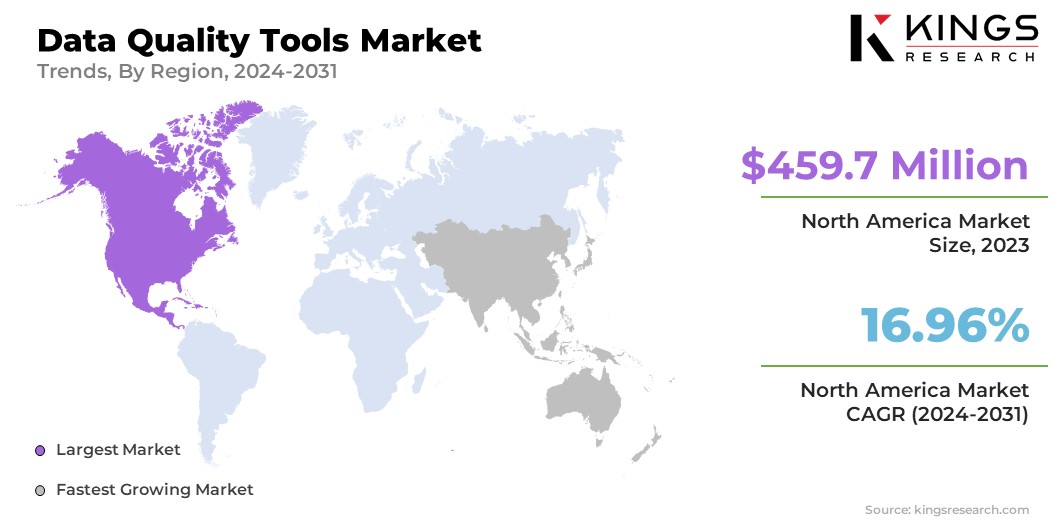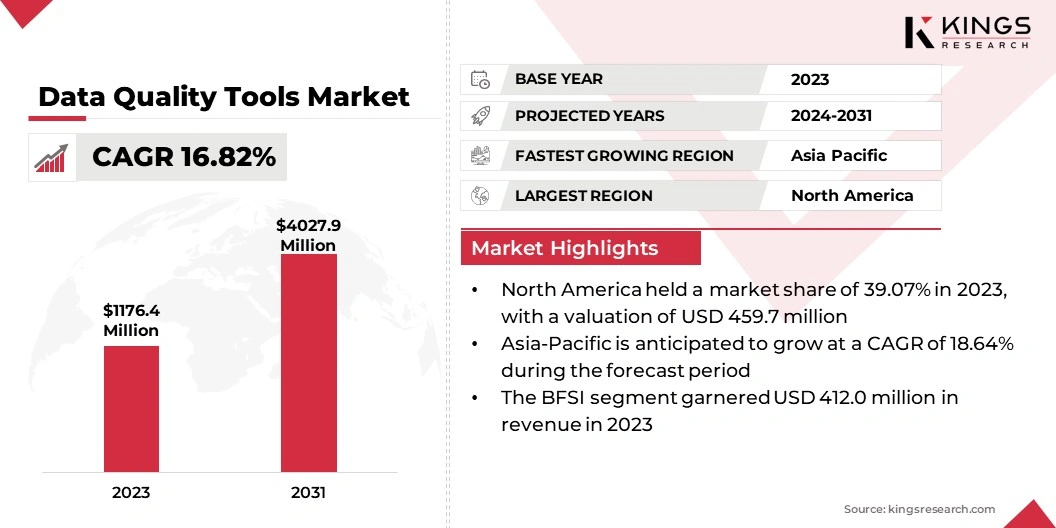ICT-IOT

Data Quality Tools Market

Data Quality Tools Market Size, Share, Growth & Industry Analysis, By Type (Customer Data, Product Data, Financial Data, Compliance Data, Others), By Functionality (Data Governance, Data Migration, Data Integration, Data Analytics, Others), By End Use (BFSI, Healthcare, Retail & E-commerce, Telecom & IT, Others), and Regional Analysis 2024-2031
Pages : 120
Base Year : 2023
Release : October 2024
Report ID: KR1120
Data Quality Tools Market Size
Global Data Quality Tools Market size was recorded at USD 1,176.4 million in 2023, which is estimated to be valued at USD 1,356.7 million in 2024 and reach USD 4,027.9 million by 2031, growing at a CAGR of 16.82% from 2024 to 2031.
Rising volume of data across enterprises and proliferation of big data technology are propelling the market. In the scope of work, the report includes services offered by companies such as IBM Corporation, SAP SE, Oracle, Informatica Inc., Talend, Inc., SAS Institute Inc., Experian Information Solutions, Inc., Precisely, Syniti, Collibra, and others.
The global data quality tools market presents a substantial growth opportunity, driven by the pivotal role accurate data plays in enhancing patient care, optimizing operational efficiency, and ensuring regulatory compliance. With the increasing adoption of electronic health records (EHRs), the demand for high-quality, reliable, and consistent data is more critical than ever.
- For instance, in September 2024, Atropos Health introduced Data Quality ScoreCards within its Evidence Network, providing contributors feedback on data quality and access to AI tools. This initiative, powered by over 300 million patient records, is transforming healthcare research and drug safety surveillance by connecting real-world data sources and improving data reliability.
Healthcare providers rely on the accuracy of data to make informed decisions regarding patient treatment, track outcomes, and ensure precise diagnoses. Additionally, healthcare data is used for research, public health monitoring, and drug development, which require superior data integrity. As healthcare data volume continues to grow due to advancements in medical technologies and the proliferation of connected devices, the need for advanced data quality tools is intensifying.
Moreover, compliance requirements in the healthcare industry due to stringent regulations, such as the Health Insurance Portability and Accountability Act (HIPAA), are making data quality tools essential for ensuring regulatory adherence and protecting sensitive patient information.
Data quality tools are a set of specialized software solutions designed to ensure the accuracy, consistency, completeness, and reliability of data across various organizational systems. These tools help businesses maintain high standards of data integrity by identifying, rectifying, and preventing potential errors.
The key functionalities of data quality tools include data profiling used for analyzing data sets for quality; data cleansing for rectifying duplicates or incomplete data; and data monitoring for ensuring quality control. These tools can also automate data validation processes to meet specific business rules or regulatory standards. Data quality tools are of different types, including cloud-based, on-premises, and hybrid models, offering businesses flexibility in deployment.
Data quality tools are utilized across various industries, including finance, healthcare, retail, and telecommunications, where data accuracy is essential for operational efficiency and regulatory compliance. By implementing these tools, organizations can enhance their data management processes, make more informed decisions, and drive business outcomes with greater confidence in the reliability of their data.
Analyst’s Review
The leading companies in the global market are actively pursuing a range of strategies to strengthen their market position and drive growth. One such strategy is the continuous innovation of product offerings, by using artificial intelligence (AI) and machine learning (ML) capabilities.
By incorporating these technologies, companies can enhance the efficiency and accuracy of data quality tools, allowing businesses to automate their data validation and processes. Another critical strategy could be the expansion of cloud-based solutions to meet the growing demand for flexible and scalable data quality tools across industries.
- In October 2023, IBM acquired Manta Software Inc., a leading data lineage platform, to enhance data quality within watsonx.ai, watsonx.data, and watsonx.governance. As businesses increasingly integrate AI, ensuring data quality and explainability becomes essential to developing trustworthy, transparent solutions within complex data ecosystems.
In terms of growth imperatives, companies may focus on expanding their market reach by targeting emerging economies where digital transformation is gaining momentum. They may also undertake partnerships with enterprise software vendors to integrate data quality tools with the latest data management and analytics platforms.
Companies are placing a strong emphasis on regulatory compliance solutions to cater to healthcare and finance segments, where data governance is essential. These strategies are shaping the competitive landscape and fueling data quality tools market growth.
Data Quality Tools Market Growth Factors
An exponential increase in data volume across enterprises is a key driver for the data quality tools market. Organizations generate, collect, and store massive amounts of data from a growing number of sources. This increase in data is fueled by the proliferation of Internet of Things (IoT) devices, digital transactions, social media, and enterprise applications.
With this surge in data, enterprises are facing unprecedented challenges in maintaining data quality, consistency, and accuracy across various systems and platforms.
- The World Economic Forum projects 181 zettabytes of data by 2025, driven by AI expansion, digital transformation, mobile network demands, and cryptocurrency mining. This exponential data growth intensifies the need for robust data quality management solutions to ensure reliability and actionable insights across industries.
Poor data quality can lead to costly errors, inefficiencies, and misinformed decisions, making the need for robust data quality tools more pressing. Moreover, businesses rely on data for critical functions such as customer relationship management (CRM), supply chain optimization, and personalized marketing.
As data plays a pivotal role in these areas, companies must ensure that their data is clean, reliable, and actionable. Data quality tools, therefore, enable organizations to streamline data management, automate error detection, and cleanse large data sets, ensuring that enterprises can make data-driven decisions with the help of accurate and relevant data.
Managing diverse data sources is a major challenge for enterprises as they deal with an increasing variety of data types and formats, ranging from structured data in traditional databases to unstructured data from social media, IoT devices, and emails. The complexity arises while integrating these disparate data sources into a unified system while ensuring consistency, accuracy, and timeliness.
Data from different systems have varying standards, units, and formats. This makes it difficult to reconcile and harmonize the information. As businesses seek to create comprehensive data views, ensuring data quality across these multiple channels becomes daunting. This challenge can be mitigated by implementing advanced data quality tools equipped with machine learning and AI that can automatically detect inconsistencies and standardize data formats from diverse sources.
Additionally, adopting a robust data governance framework can help ensure that data quality processes are standardized across the organization, allowing businesses to integrate and manage their data more effectively while minimizing errors and inconsistencies.
Data Quality Tools Market Trends
The increased adoption of artificial intelligence (AI) and machine learning (ML) in data quality solutions is revolutionizing how organizations manage and maintain their data. These technologies successfully automate data validation, cleansing, and profiling processes, which traditionally required manual intervention and were prone to human error.
AI and ML algorithms can analyze large data sets in real time and identify patterns, anomalies, and inaccuracies that may be missed by traditional methods. This enhances the overall efficiency of data quality management and ensures higher levels of accuracy and consistency.
- In March 2024, SAP SE unveiled new data innovation, including generative AI features within SAP Datasphere, to improve data quality and accelerate business insights. These features simplify data landscapes, enhancing enterprise planning and interaction, helping businesses leverage AI for greater efficiency and decision-making power.
Furthermore, AI-driven data quality tools can learn from historical data and improve over time, offering predictive analytics to anticipate and resolve potential data quality issues before they escalate. The integration of these technologies is also helping companies handle the rising complexity of data management, particularly as data volumes grow and become more varied.
By adopting AI and ML-based data quality solutions, businesses may streamline their data processes, reduce operational costs, and ensure that their data is fit for purpose in a competitive, data-driven landscape.
Segmentation Analysis
The global market has been segmented on the basis of type, functionality, end use, and geography.
By Type
Based on type, the market has been divided into customer data, product data, financial data, compliance data, and others. The customer data segment captured the largest data quality tools market share of 35.48% in 2023 indicating the increasing importance of customer data management in today’s business landscape.
Companies across various industries are recognizing the critical role of customer data in driving strategic decisions and enhancing customer experiences. This dominance can be further attributed to the growing reliance on customer relationship management (CRM) systems, which collect and analyze customer interactions to improve marketing effectiveness and service delivery.
Furthermore, the rise of personalized marketing strategies has led businesses to invest heavily in collecting and analyzing customer data to tailor their offerings. As companies seek to gain insights into customer preferences and behaviors, they are turning to data quality tools to ensure that their customer data is accurate and reliable.
Additionally, regulatory pressures, such as GDPR and CCPA, have made it essential for organizations to manage customer data responsibly and ensure compliance, driving further investment in data quality tools.
By Functionality
Based on functionality, the market has been classified into data governance, data migration, data integration, data analytics, and others. The data governance segment is poised to record a staggering CAGR of 18.54% over the forecast period, which highlights the growing recognition of data governance as a crucial element in data quality management and compliance across organizations.
As businesses generate ia plethora of data, the need for structured policies and procedures for data management has become paramount. Organizations are now realizing that effective data governance is essential for ensuring data integrity, security, and compliance with various regulations, such as GDPR and HIPAA.
The rise of data privacy concerns among consumers and regulatory bodies has compelled organizations to prioritize data governance strategies to mitigate risks associated with data breaches and non compliance. This has resulted in a surge of investments in data governance tools to enable businesses to establish clear ownership, accountability, and transparency in data management practices.
Additionally, the trend of digital transformation has increased the complexity of data environments, further emphasizing the need for robust data governance frameworks.
By End Use
Based on end use, the market has been divided into BFSI, healthcare, retail & e-commerce, telecom & IT, and others. The BFSI segment led the data quality tools market in 2023, reaching a valuation of USD 412.0 million.
Stringent regulatory requirements imposed by financial regulatory authorities, necessitate the implementation of effective data quality management solutions to ensure accuracy and integrity in reporting and decision-making. Furthermore, the increasing digitalization of banking and financial services has led to a surge in data generation from online transactions, customer interactions, and mobile applications.
This growing volume of data has generated a high demand for robust data quality tools that can manage and cleanse data effectively, ensuring institutions can provide reliable services while adhering to compliance standards. Additionally, the BFSI sector is focused on enhancing customer experience through personalized offerings and improved service delivery, further driving the need for accurate customer data management.
Data Quality Tools Market Regional Analysis
Based on region, the global market has been segmented into North America, Europe, Asia-Pacific, MEA, and Latin America.

North America data quality tools market Share accounted for 39.07% of the global market and was valued at USD 459.7 million in 2023. This substantial share can be attributed to a strong emphasis on data-driven decision-making and rapid digital transformation across various industries, including finance, healthcare, and retail. The presence of major technology companies and robust IT infrastructure has also played a significant role in propelling market growth in this region.
As organizations increasingly recognize the importance of high-quality data for competitive advantage, investments in data quality tools have surged. Moreover, regulatory compliance requirements, such as the Health Insurance Portability and Accountability Act (HIPAA) and the Sarbanes-Oxley Act, have necessitated stringent data management practices, further driving the demand for these tools.
Additionally, North America is home to a significant number of established data quality solution providers, facilitating innovation and access to advanced technologies. The increasing adoption of cloud-based solutions and artificial intelligence (AI) in data management are expected to propel the market, as businesses seek more efficient and scalable options to maintain data quality.
Overall, North America’s dominant position in the data quality tools market reflects its strategic focus on leveraging data for enhanced operational efficiency and customer satisfaction.
Asia-Pacific is expected to grow at the highest CAGR of 18.64% in the coming years, due to rapid digitalization and increasing awareness of the importance of data quality among businesses in the region.
As economies in Asia-Pacific continue to evolve, organizations are recognizing that effective data management of data is essential for gaining a competitive edge in the marketplace. The surge in data generation from various sectors, including e-commerce, healthcare, and finance, necessitates robust data quality tools to ensure data accuracy and consistency.
Additionally, the increasing adoption of advanced technologies such as artificial intelligence (AI), machine learning (ML), and big data analytics is propelling the demand for data quality solutions in the region. These technologies enable organizations to process vast amounts of data efficiently and derive actionable insights, making data quality management a priority.
Furthermore, growing concerns around data privacy and compliance with regulations, such as the General Data Protection Regulation (GDPR) and local data protection laws, are driving investments in data governance and quality tools.
Competitive Landscape
The global data quality tools market report provides valuable insights, highlighting the fragmented nature of the industry. Prominent players are focusing on several key business strategies, such as partnerships, mergers and acquisitions, product innovations, and joint ventures, to expand their product portfolio and increase their market shares within different regions.
Companies are implementing impactful strategic initiatives, such as service expansion, research and development (R&D) investments, establishment of new service delivery centers, and optimization of their service delivery processes, which are likely to create new opportunities for market growth.
List of Key Companies in Data Quality Tools Market
- IBM Corporation
- SAP SE
- Oracle
- Informatica Inc.
- Talend, Inc.
- SAS Institute Inc.
- Experian Information Solutions, Inc.
- Precisely
- Syniti
- Collibra
Key Industry Developments
- August 2024 (Partnership): Collibra launched its integration with SAP Datasphere, enabling scalable access to critical business data. This integration would enhance SAP Analytics Cloud and supports SAP Datasphere models, providing joint customers with trusted, governed data. This development marks a key step in establishing a unified business data fabric across enterprises' data landscapes.
- June 2024 (Expansion): Syniti announced that Caldic, a global solutions provider, will leverage Syniti’s Knowledge Platform to enhance data quality and establish a global master data management (MDM) framework. This partnership would show that Caldic can operate with clean, high-quality data, fostering active governance and sustained data accuracy in the long term.
The global data quality tools market has been segmented:
By Type
- Customer Data
- Product Data
- Financial Data
- Compliance Data
- Others
By Functionality
- Data Governance
- Data Migration
- Data Integration
- Data Analytics
- Others
By End Use
- BFSI
- Healthcare
- Retail & E-commerce
- Telecom & IT
- Others
By Region
- North America
- U.S.
- Canada
- Mexico
- Europe
- France
- UK
- Spain
- Germany
- Italy
- Russia
- Rest of Europe
- Asia-Pacific
- China
- Japan
- India
- South Korea
- Rest of Asia-Pacific
- Middle East & Africa
- GCC
- North Africa
- South Africa
- Rest of Middle East & Africa
- Latin America
- Brazil
- Argentina
- Rest of Latin America
CHOOSE LICENCE TYPE
Frequently Asked Questions (FAQ's)
Get the latest!
Get actionable strategies to empower your business and market domination
- Deliver Revenue Impact
- Demand Supply Patterns
- Market Estimation
- Real-Time Insights
- Market Intelligence
- Lucrative Growth Opportunities
- Micro & Macro Economic Factors
- Futuristic Market Solutions
- Revenue-Driven Results
- Innovative Thought Leadership

.webp)